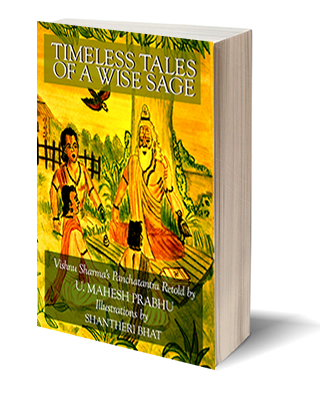Mahesh Prabhu's Blog, page 41
June 12, 2020
The Vedic origins of Rationalism
To answer these questions, we need to understand the very definition of rationalism, first & foremost.
Rationalism is known as the practice or principle of basing...
June 9, 2020
The True Nature of Vedic Knowledge & Wisdom
Vedic texts, starting from Vedas, Upanishads, Aranyakas, Brahmanas, Vyasa’s Mahabharata, Valmiki’s Ramayana until Kautilya’s Arthashastra, are often described as “religious scriptures.” That is not just inaccurate but also misleading.
Vedic texts do not mention any “God” or, even, “Gods” per se. They do mention gross elements, namely: Prithvi, Agni, Toyam, Vayu, and Akash. Vedic texts explain how these elements of nature make this body happen and therefore seeks to honor these elements and, also...
Why Meditating is not the same as Praying?
The Mind is a mystery which even modern science is yet to comprehend fully.
According to Rishis the mind, even though emanates from the body, is neither the body nor the brain. Mana or Mind is that which helps us understand the world outside. It is that intangible component in this body that makes tangible known. It plays a crucial role in our physical existence.
Dhyana is a Vedic Sanskrit word which comprises of two words, namely: Dhya meaning focus and Yana implying mechanism. So Dhyana is lit...
June 8, 2020
YUGAS: Understanding their Origins & Prevailing Misconceptions
Vedic calendars called Panchanga, which are followed even today by religiously sagacious Hindus, can predict with precision the rise of the sun, the moon, arrival of seasons, comets, and even solar and lunar eclipses. These Panchanga divide time in Kshana (seconds), Kastha (5 Kshana), Laghu (15 Kastha), Danda (15 Laghu), Muhurta (2 Danda), Ahoratram (30 Muhurta), Masa (30 Ahoratram), Ritu (2 Masa), Ayana (3 Ritu) and Samvatsara (2 Ayana or one year). Yugas (which are four, namely: Krita, Treta...
June 6, 2020
Hitashatru: That mortal enemy we mistake for a dear friend
One of the greatest myths about success or wealth is that “it will earn you a lot of friends” and, that “it will make you happy.” Only a person who has tasted success in all his pursuits can confirm how incorrect those assumptions are.
Jealousy of people is among the many things that come along with success and wealth. And it is by far the most potent threat as it could turn even a dear friend into a deadly enemy. And when that enemy continues to pose as a friend, enjoying proximity to you, (s)h...
June 2, 2020
How can practitioners of Yoga & Ayurveda benefit from Kautilya’s Arthashastra?
The word Yoga comes from root Vedic Sanskrit word Yuj, which means The Path. However, the Yoga, as we know it today, i.e., as an exercise, is Ashtanga Yoga. Also, Patanjali did not invent the Ashtanga Yoga as it is wrongly believed by many. Patanjali’s Yoga Sutras are mostly a collection of teachings from various Rishis and Rishikas who preferred to stay aloof from the material world by shunning all sorts of recognition. Even the four Vedas were written by such sage men and women, who sought the...
May 30, 2020
The Vedic Perspective on Criticism
Exclusive to Vedic Management Centre by U. Mahesh Prabhu
Let me start with a tale from my book – RISHI TALES 1:
The old king, on his deathbed, told his son, “My boy, be good and do good, and never disregard our minister’s comments or suggestions.”
After the death of the king, this prince ascended the throne.
The young king was never happy with the old minister for he always found some fault with the king’s ways.
The young king bore the minister’s criticism patiently for five years but one day, h...
May 29, 2020
Panchatantra: Why is it Still Relevant?
 Author of “Timeless Tales of a Wise Sage: Vishnu Sharma’s Panchatantra Retold”, U. Mahesh Prabhu, explains why he chose to retranslate Panchatantra – a Sanskrit classic believed to be at least 3,000 year old – yet again.
Author of “Timeless Tales of a Wise Sage: Vishnu Sharma’s Panchatantra Retold”, U. Mahesh Prabhu, explains why he chose to retranslate Panchatantra – a Sanskrit classic believed to be at least 3,000 year old – yet again.Storytelling is one of the oldest art forms known to mankind. It has stimulated imaginations and even built communities of tellers and listeners. Oral storytelling, particularly, is an ancient and intimate tradition between storytellers and listeners. Storytelling is also a soci...
May 24, 2020
Elevating oneself from Poverty to Prosperity unto Perpetual Bliss
Since most of the Vedic ॠषि Rishis (authors of Vedic texts) lived away from civilization, in the woods, a great many tend to wrongly assume “suffering poverty” to be a “Vedic ideal.” Nothing can be farther from the truth. Neither did the Vedic Rishis glorified poverty nor did they demonize wealth. A great many of the Rishis were the ones who lived a financially affluent life before renouncing it all of their own volition to become hermits and renunciates. Valmiki, the celebrated author of Ramaya...
May 22, 2020
Mantra: The Idea that Creates, Sustains or Destroys
Mantra is by far the most misused as well as abused word of Vedic Sanskrit. The mantra was never some “spell” reciting which you could recite to “magically” summon “divine powers” or “superhuman intervention.” Mantra is also considered by many to be synonymous with yet another Vedic Sanskrit word Shloka.
Rishis and Rishikas, sages of Vedic era, wrote Shlokas or hymns enumerating their experiences, knowledge, and wisdom; which they considered are crucial in sustaining balance in life; to find pe...



